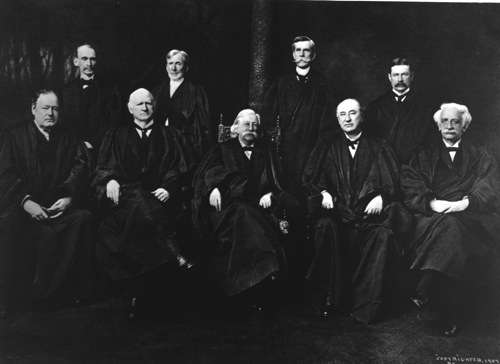The Volokh Conspiracy
Mostly law professors | Sometimes contrarian | Often libertarian | Always independent
Today in Supreme Court History: December 2, 1907
Editor's Note: We invite comments and request that they be civil and on-topic. We do not moderate or assume any responsibility for comments, which are owned by the readers who post them. Comments do not represent the views of Reason.com or Reason Foundation. We reserve the right to delete any comment for any reason at any time. Comments may only be edited within 5 minutes of posting. Report abuses.
Please to post comments



United States v. Stapf, 375 U.S. 118 (decided December 2, 1963): estate not entitled to marital tax deduction where will required widow’s share to be transferred to children
United States v. Powell, 423 U.S. 87 (decided December 2, 1975): 18 U.S.C. §1715, criminalizing mailing of concealed-carry-capable weapons to general public (for example, defendant’s 22-inch sawed-off shotgun), was not unconstitutionally vague (so far as I know, this statute survives Heller and McDonald)
United States v. Jose, 519 U.S. 54 (decided December 2, 1996): order enforcing IRS summons but requiring IRS to give five days’ notice to taxpayer before forwarding produced documents to its criminal division was “final order” and therefore appealable
Not to be confused with Mighty Joe Young. That was a film.
The opinion by Justice Peckham, of Lochner fame, began somewhat curiously:
We recognize and appreciate to the fullest extent the very great importance of this case, not only to the parties now before the court, but also to the great mass of the citizens of this country, all of whom are interested in the practical working of the courts of justice throughout the land, both Federal and state, and in the proper exercise of the jurisdiction of the Federal courts, as limited and controlled by the Federal Constitution and the laws of Congress.
That there has been room for difference of opinion with regard to such limitations the reported cases in this court bear conclusive testimony. It cannot be stated that the case before us is entirely free from any possible doubt, nor that intelligent men may not differ as to the correct answer to the question we are called upon to decide.
Yes. Justice Harlan dissented.
The ruling provides a workaround to constitutional sovereign immunity, a legal fiction that requires workarounds in a sane legal system. It allows plaintiffs to sue in federal courts to prevent state officials from enforcing unconstitutional state laws.
Ex Parte Young sought very narrow relief. One law enforcement official was to be prevented from suing one company over one law. But it opened the door to class actions and preclusive effect against non-parties.